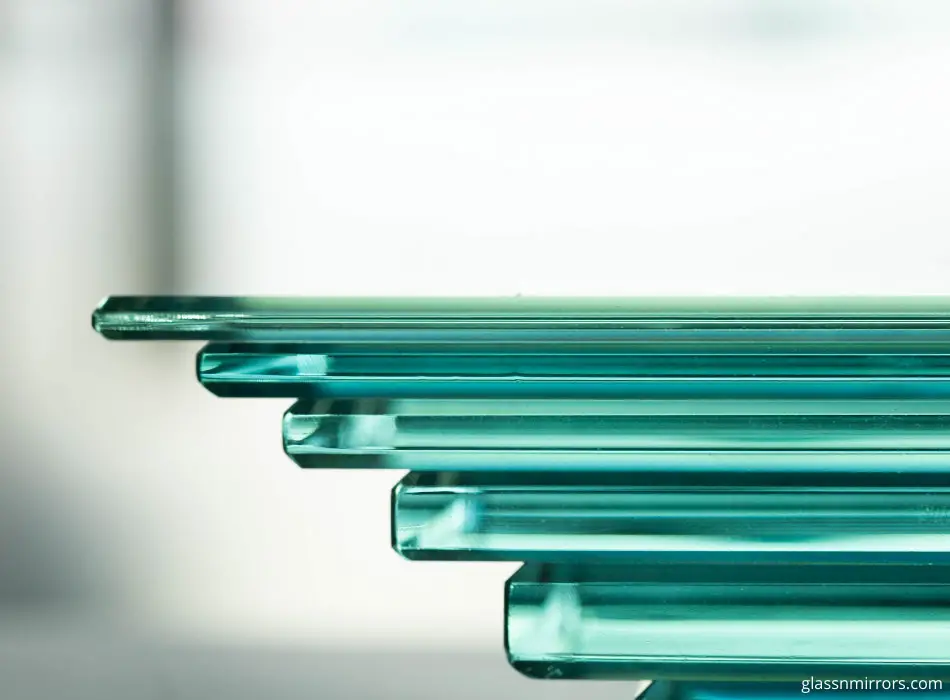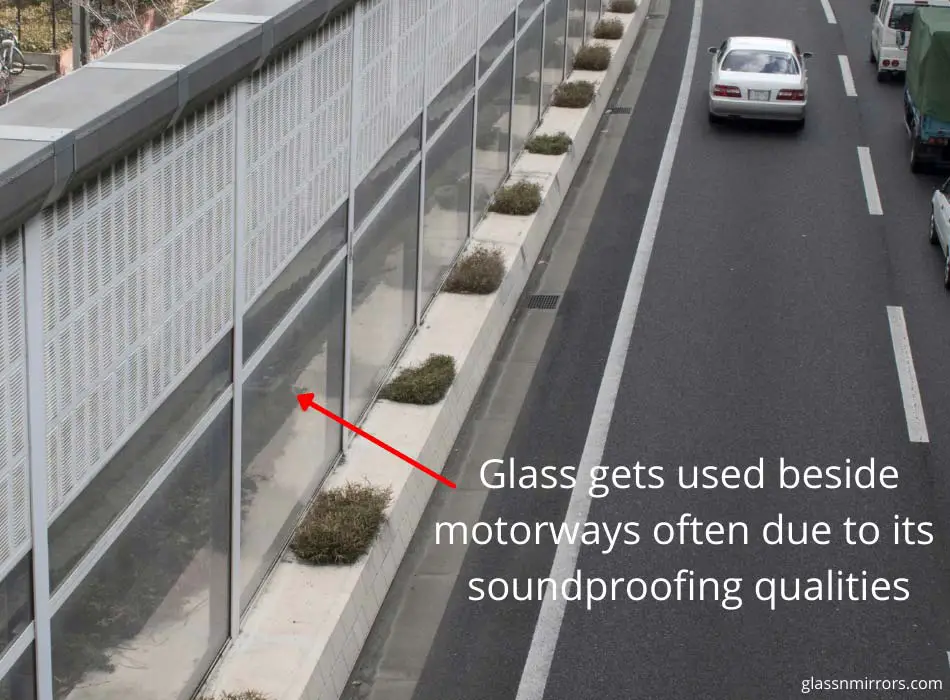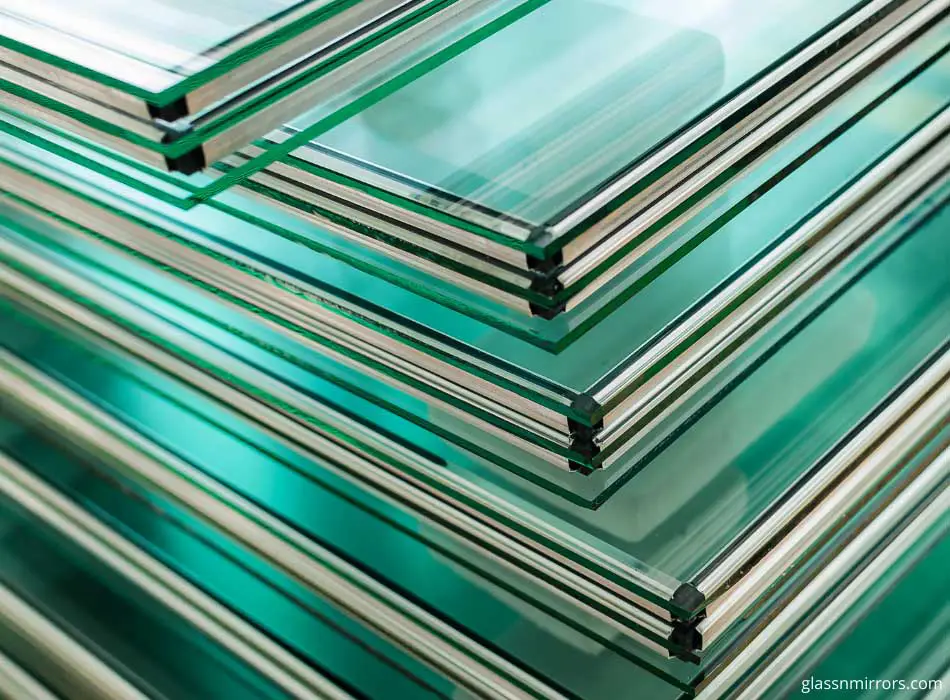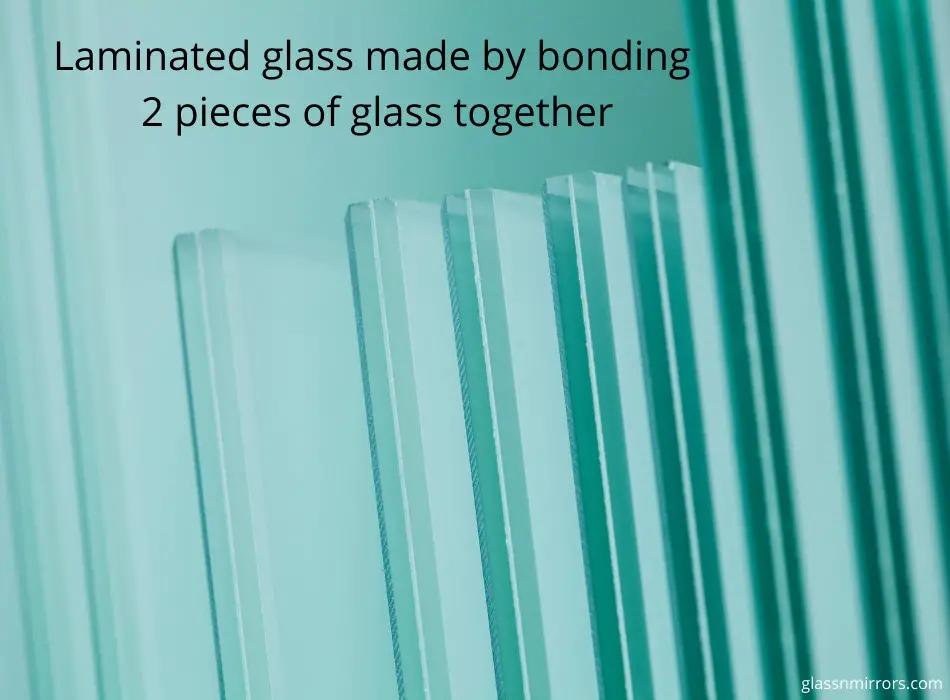Insulation helps soundproof and heatproof (or coldproof) a space. Temperature retention and soundproofing are directly proportional to each other but are not equally easy to measure. Heat loss in glass can be measured better than sound permeability, which means we can easily tell how much thickness affects it. In saying this…does thicker glass Insulate Better?
In general, thicker windows reduce heat loss only slightly. Compared to a 0.11-inch (2.79mm) clear glass window, a 0.64-inch (16.25mm) increase in thickness yields a 0.08% reduction in heat loss. In comparison, a double glazed window provides a 79% reduction in heat loss without increasing a single panel’s thickness.
In this article, you will learn more about windows and insulation, including how effective thickness, double glazing, and lamination are at soundproofing and temperature regulation. You will also discover which type of window is best for your situation. But before that, let’s dive deeper into windows and heat loss.

Table of Contents
- 1 Heat Loss and Glass: A Brief Overview
- 2 Is Glass Good for Soundproofing?
- 3 How Thick Should Window Glass Be?
- 4 Is Thicker Glass Better Than Double Glazing
- 5 Are Single Glazed Windows Cold?
- 6 Is Laminated Glass Good for Insulation?
- 7 Can Glass Be Soundproof?
- 8 Does Thicker Glass Reduce Noise?
- 9 Are Double Glazed Windows Expensive?
- 10 Final Thoughts – Does Thicker Glass Insulate Better?
- 11 What Is Panda Glass | Ultimate Guide To Panda Glass
- 12 Can Heat Break Glass? Temperature & Fracturing Explained
- 13 Why Is Glass Polar? – Glass Polarity Explained!
Heat Loss and Glass: A Brief Overview
Heat loss is calculated in watts per square meter, per Kelvin, or W/m2K. It is referred to as the U-value of a window, glass panel, or even a room in question. As the unit suggests, this is calculated in more or fewer watts of energy required per square meter with each Kelvin’s increase or decrease.
It is easier to think of heat loss in terms of percentage increase and decrease in the U-value instead of the U-value itself. The table below covers the U-value and the percentage reduction in heat loss at various degrees of thickness.
| Glass thickness (inches) | U-Value / Rate of Heat Loss – W/m2K | Percentage reduction from original value |
|---|---|---|
| 0.11 (Original Value) | 5.9 | 0.00% |
| 0.15 | 5.9 | 0.00% |
| 0.19 | 5.8 | 0.01% |
| 0.23 | 5.8 | 0.01% |
| 0.31 | 5.7 | 0.03% |
| 0.39 | 5.7 | 0.03% |
| 0.47 | 5.6 | 0.05% |
| 0.59 | 5.5 | 0.07% |
| 0.74 | 5.4 | 0.08% |
The above table shows that having a six times thicker glass will barely get you a 0.1% reduction in heat loss.
The sound reduction is better with thickness but now by a lot. Ultimately, it is through insulation or the infusion of non-glass matter into a window that it becomes better at retaining heat or preventing sound from passing through.
The soundproofing difference is a lot more prominent, with a glass of twice the thickness having almost half the sound conductivity.
If your main objective is to regulate the temperature, then you should dismiss thickness and opt for an alternative heat-loss prevention structure like double-glazed glass.
In case you’re looking for a material that soundproofs a room to an extent, and don’t mind average heat regulation performance, then the thick glass is okay.
If you want to regulate temperature –
dismiss glass thickness and opt for double glazing
Is Glass Good for Soundproofing?
Glass is good for soundproofing because it insulates an area from sound vibration because of its density. While thinner sheets of glass can rattle in their frame, thick glass can be used to soundproof a space practically.
However, this doesn’t mean installing thick glass windows will make a room soundproof. You must first look for the conductivity of the material aside from the windows. If the common flooring or wall and partitions are made of plywood, then the sound will travel through regardless of whether the windows are soundproof or not.
Thicker glass does a good job at providing soundproofing
You must spot gaps as well because any room for air to travel is also room for the sound to travel. On average, air is the most conductive material for sound. All soundproofing efforts yield zero results if there is room for enough air to pass through.
For a room to be 100% soundproof, it has to be airtight and built with insulating windows and walls.
The wall must be thick and made of a durable material like concrete or red bricks. Since the door and the windows are the possible escape routes for sound, using thick glass for your window and padding on your door can help when building such a room.

For windows, there are two options. The first is to get a thick glass sheet, which can help soundproof the room to a large extent. The second is a far more effective soundproofing method called double glazing. Double glazing creates a pocket of air between two glass sheets.
The sound barely travels through the thick glass and has to cover a small distance being carried by air. Then, it has to penetrate another sheet of glass. This multi-stage loss of energy results in the efficiency of sound transfer coming down to nearly zero.
There are also triple glazed windows that are used specifically for high-stakes soundproofing situations. Even in the triple-layered glass, the thickness plays a major role in making a window soundproof. The thicker the glass, the more it insulates.
Most people like using thicker glass on their sliding glass doors.
As for double or triple glazing, the distance between the sheets dictates a window’s soundproofing thickness. In advanced soundproofing systems, the space between the glass sheets is 80% to 95% vacuum making it nearly impossible for sound waves to pass through.
How Thick Should Window Glass Be?
A window should be 0.3 inches (7.62mm) thick for optimal durability and sound reduction but can be 0.1 inches thick for all practical purposes. The maximum thickness for most window panels is 0.7 inches, beyond which the thickness of the glass becomes a liability.
How thick you want the windows depends on your primary objective. The following table covers glass thickness recommendations by different contexts.
| Situation | Consideration | Recommended Thickness |
|---|---|---|
| You have a large window that covers at least two times the area of a regular window. | To match the large area, the thickness of the window must be raised proportionately. | 0.2 inches (5.085mm) thick at a minimum. |
| You have kids | The window needs to be durable | 0.3 inches (7.62mm) thick on average. |
| You own a high-rise apartment in a windy city. | The window glass must be heavy enough to resist wind. | 0.5 (12.7mm) to 0.7 inches (17mm) thick. |
| You live in a noisy neighborhood. | The window must be thick enough to reduce noise. | 0.7 inches thick glass or 0.4 inches (10mm) thick laminated glass. |
| You live in a hot region | The window must be thin to avoid trapping heat | 0.1 inches (2.5mm) thick-coated glass |
| You live in a cold region | The window must be thick to prevent heat loss | 0.7 inches thick glass or 0.2 inches double glazed glass. |
| You barely use air conditioning or heater | A standard window should be okay for you. | 0.1 inches (2.5mm) thick glass |
* Please note the above glass thicknesses are a guide only based on current industry standard information. Thickness may change depending on the type of glass used. You should consult with your builder or architect before proceeding.
Is Thicker Glass Better Than Double Glazing
Thicker glass is not better than double glazing for insulation purposes but is more durable. To have a soundproof window that regulates temperature better and doesn’t shatter easily, a window must be double glazed and made of thicker glass.

Since most people are working with a finite budget, they have to pick and choose between thick windows or double-glazed ones. If you cannot have double-glazed windows made from thick glass, the following comparison will help you decide what’s better for you.
Thick Glass
| Pros of Thick Glass | Cons of Thick Glass |
|---|---|
| Is more durable. | Is heavy and hard to install. |
| Is better for security. | Doesn’t regulate temperature very well. |
| Less likely to bow or warp. | Is very costly. |
Double Glazing
| Pros of Double Glazed Windows | Cons of Double Glazed Windows |
|---|---|
| Are more soundproof. | Can shatter with (comparative) ease. |
| Better at controlling temperature | Can trap heat |
| Have little to no condensation | Practically impossible to repair |
With the above comparison, it is evident that one should get thick glass windows when durability is a priority and soundproofing and temperature regulation are preferences. In contrast, when insulation is the highest priority, one must get double-glazed windows.
Will thicker glass cause shadows? Read my full article here – Does glass have a shadow?
Are Single Glazed Windows Cold?
Single glazed windows are cold in the winter and hot in summer. They allow the external temperature to influence a room’s internal temperature, which puts pressure on the air conditioning and indoor heating during summers and winters, respectively.
While glass is a poor conductor of heat compared to metals, it still transfers heat pretty efficiently. That’s why single glazed windows are not ideal for keeping your room warm or cold with indoor temperature control.
If you cool your room with air conditioning, the heat from outside gets transferred into the room. And if you use floor or room heating to make your room warm, the heat leaks outside, making the room cold. As a result of this, your heating (or cooling) bill increases because of a single glazed window.
Is Laminated Glass Good for Insulation?
Laminated glass is good for insulation compared to standard single glazed windows, but not as good as double glazed windows. Lamination makes the window thicker and harder to pass heat and sound through, but some heat and sound can pass through the window.
Lamination has some insulation value, but it cannot be compared to double glazed windows, which are made specifically to be as effective as possible at insulation. The table below shows the hierarchy of insulation.
| Window type | Insulation Value |
|---|---|
| Triple Glazed High Vacuum Window | Highest insulation value with nearly 100% soundproofing properties. |
| Double Glazed High Vacuum Window | Provides almost 100% soundproofing but isn’t as effective as its triple-glazed equivalent. |
| Thick Glass Triple Glazed Window | Third-highest insulation value. Allows loud noises and some heat to pass through. |
| Thick Glass Double Glazed Window | Fourth-highest insulation value. Allows some noise and heat to pass through. |
| Thick Glass Laminated Window | Mostly soundproof, albeit less than multi-glazed windows. |
| Thick Glass Single Glazed Window | Allows heat to pass through, holds back some noise |
| Standard single glazed window | Provides poor insulation and allows most noise to pass through. |
On an average budget, you’ll be able to get a double glazed window or a laminate thick glass window, both of which will have decent soundproofing performance.
Since glass allows light to travel into a room, the double glazed window might make a room too hot during the summer because it doesn’t allow heat to move out. But that’s a problem that can be resolved by cracking the window open for a few minutes.

If you have kids, you should opt for laminated thick glass windows because if there’s any damage to a double-glazed one, the window will need to be replaced.
Double glazed windows cannot be fixed, and cracks can compromise their structure and bring their performance down to that of a single glazed window. This doesn’t happen with laminate glass.
Can Glass Be Soundproof?
Glass cannot be soundproof, but windows can be if they feature two sheets of glass with a vacuum in between. This keeps sound waves from traveling through the window because of the lack of air in the gap. Most soundproof windows are not 100% soundproof but can prevent average noises from passing.
Laminated glass is quite soundproof because it doesn’t allow sound to vibrate through it as easily as a standard single glazed window.
Glass can be thick enough to block most sounds, but relying on thickness to block sounds can result in an impractically heavy window. Instead, insulation with double glazing or resin lamination is a cheaper solution to crafting a window that makes it harder for sound to pass through.
Ever wonder can glass be converted back to sand? Check out my article explaining the truth.
Does Thicker Glass Reduce Noise?
Thicker glass reduces noise as it creates a larger solid distance through which sound waves have to travel. Because it is thick, it does not vibrate enough to allow sound to pass through as easily. Still, certain loud noises can pass through a thick glass window.
There are four types of windows, and in each, making the glass thicker helps reduce the noise further. And while making a glass thicker does help reduce noise, its main benefit is in reducing the fragility of glass.
The following two practices can help soundproof better than increasing glass thickness:
- Infusing glass with less conductive material – This can be seen in laminated glass, which is infused with transparent resin.
- Producing a vacuum between two panels of glass – Double glazed glass and triple glazed glass boast use this method of insulation.
Of the above, the multi-layer vacuum technology doesn’t add as much to the durability of glass. This leads us to the following conclusions:
- Thick glass is best for durability and longevity.
- Double and triple-glazed glass is best for soundproofing and temperature regulation.
- Laminated glass is best at neither but provides decent sound-proofing and heat regulation while being more durable than multi-glazed windows.
Durability is the weakness of multi-glazed glass, while insulation is the weakness of thick glass. Laminated glass beats both thick glass and multi-glazed glass on their respective weaknesses. But when it comes to the strength of double-glazed windows or the durability of thick glass, laminated glass does not exceed either.
Are Double Glazed Windows Expensive?
Double glazed windows are more expensive than single glazed windows as well as laminated single sheet windows. They’re also more expensive than single glazed thick glass windows. The rationale for their high price is that they’re better at insulation.
The table below shows the hierarchy of expenses in different glasses going from 1 (least expensive) to 10 (most expensive).
| Window type | Expensiveness rating (starting from the lowest) |
|---|---|
| Single glazed thin sheet window | 1 |
| Single glazed thick glass window | 2 |
| Single glazed laminated glass window | 3 |
| Single glazed laminated thick glass window | 4 |
| Double glazed medium thickness window | 5 |
| Double glazed thick glass window | 6 |
| Double glazed laminated glass window | 7 |
| Triple glazed medium thickness window | 8 |
| Triple glazed thick glass window | 9 |
| Bulletproof window | 10 |
Final Thoughts – Does Thicker Glass Insulate Better?
Thicker glass insulates better than standard window glass, at least technically. But when it comes to practical soundproofing or heat retention, you must opt for window glass technology designed to prevent heat loss and reduce sound transfer more efficiently.
The best durable option is laminated glass while the most effective insulation method is triple glazing with a nearly 100% vacuum gap.
For more real and practical information – be sure to see my other articles at Glass N Mirrors.
-
What Is Panda Glass | Ultimate Guide To Panda Glass

When looking for a new phone case, you may have encountered the term “panda glass.” A variety of phone cases on the market use this type of glass. But what … Keep Reading
-
Can Heat Break Glass? Temperature & Fracturing Explained

Even though technology has improved, you may have heard of a glass door suddenly breaking with a loud pop and a smashing sound. There have been many reports of windows … Keep Reading
-
Why Is Glass Polar? – Glass Polarity Explained!

You may have heard the term “polar” used when discussing glass. But what does that mean? And why is glass polar in the first place? The difference between the electronegativity … Keep Reading

2 thoughts on “Does Thicker Glass Insulate Better?”
Comments are closed.